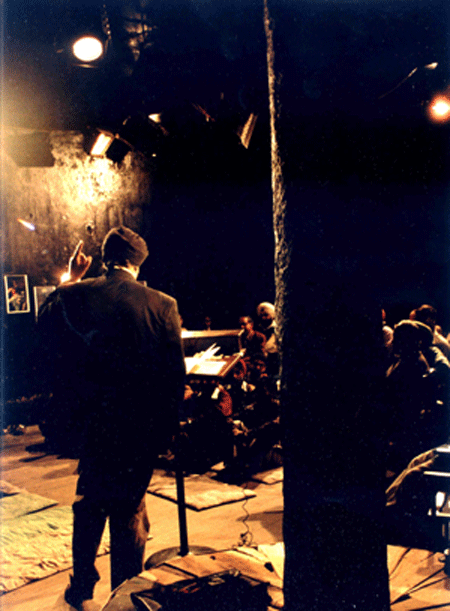|
'A Man With Ten Shadows' by Atamjit
A column by Atamjit, Hindustan Times, April 29, 2008
"Best of Times, Worst of Times"
An interview by Caroline Scott, Sunday Times, London, April 2005
Hun Interview
April 2005
"Real home of man is where he has dignity"
An interview with Amarjit Chandan, Sunday Tribune, Chandigarh, June 1999
"Apnay Baray" (On Myself) by Amarjit Chandan
On Amarjit Chandan
| Amarjit, Chandigarh 2000 |

|
| Photo by Diwan Manna |
"It is a paradox how one can be most productive when one is most lonely. His work shows that Amarjit Chandan lives in
deep solitude, in the loneliness of isolation, the emotion of a man with no land, a man who has been cut away from his roots
but keeps them safe as a memory in the bottom of his heart and mind.
"His memories drive him somewhere else, towards a no man's land, a land whereon are charted his recollections, his
dreams, his childhood friends that are no longer there, his adolescent self that has escaped him. In this imaginary land,
impressions, moments, fleeting images, flashes of emotions, cloaks of the mind, masks claim for themselves the ambience of
reality. In his poetry the Moment becomes the only reality, enhanced as the most eminent song, a truly grand experience. Chandan
gives us the impression of a constant journey. He travels incessantly, always looking outside the window, resting his mind
on the images that pass by his eyes, instant by instant.
"Living with the anguish of belonging, Chandan takes off with an aeroplane named "need", transforming his
existence into pain, want, loneliness. The only moments of relief seem to be the moments when he writes, his only joy his
poetry, second only to the moment of erotic climax, when the gap inside him is bridged, be it for just a moment.
"His poems are an escape to archetypical images. Language, any language, Punjabi, English or Greek is for him nothing
but a vehicle, the words at the edge of his pen are dressed with unexpected colours, they are waiting for us in the next line
to leave us speechless, to remind us of something we already know, something rather painful and full of nostalgia.
"His imagery lacks anything pretentious. On the contrary, it is surprisingly intimate. It seems to picture our own
moments, to capture our own thoughts, to express our own dreams, the contradiction in our minds. Chandan's descriptive power
is sublimating: the analytic depths of his expression deprive the reader of his right to evade, give him a disarming hand
and guide him to paths strangely familiar.
"In his poetic speech, impressions, perceptions and memories become the thread of our own thought and life, which
Chandan weaves and unweaves in the loom of nostalgia."
Christina Linardakis
Translated from Greek by Andreas Pitsillides
|

